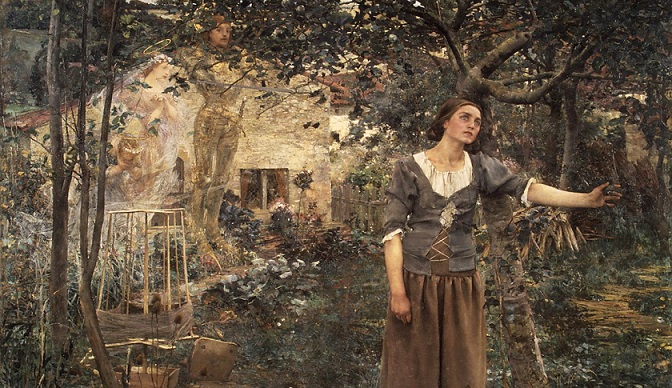Orchards Let Light In
“Oh to be like ‘The Man who Planted Trees’”
There is a grove that in the meadow grows
Where stately fruit-filled stanchions bloom
And in the fruit there is a juice that flows
Like water breaking from a pregnant womb.
As misty dreams rise with the hopeful sun
The shadows of the trees lie pointing west
Anticipating the lines of everyone
And giving life to ideas expressed.
The grassy garden is covered with rows
Of fruit trees rooted in biblical soil,
Watered with a Grecian spring that flows
And tended by Anglo tillers who toil.
The tender blades of grass sprout in their shade
Receiving lines that fall as ripe as fruit
To share unspoken thoughts that cannot fade
Though all the world’s brute force might make them mute.
Beneath the sweaty sun the trees produce
That which gives life and breath to inner parts.
The élan vital in their gentle juice
Bestows a spirit that fuels future hearts.
Today the sun sets on the stand of trees
They have fulfilled the aging bard’s request
And made insightful all the lines but these.
The work is done; the Harvest laid to rest.
Sonnet No. 9
The bard and many other learned men
Have proclaimed the place where true love does stay
When waning words fall short and at wits end—
True love dwells in your heart is what most say.
My love for you has grown beyond the size
Of even the world’s largest human heart.
It fills my chest, my head, my arms, my thighs
With ardor that all art could not impart.
What, my fair lady, is the vessel grand
Enough that could dare to behold thy grace
And be so bold as to caress thy hand
But dare not stare at thy pure faultless face?
I love just you with all that is within
This dusty cover that I call my skin.
Sonnet to Spring
The lyric voice of Nature’s songs take wing.
The larkspur and pink rose add lively cheer,
The Springtime sunshine smothers every thing,
Dark shadows even slowly disappear.
You are the youth of every year I know,
So with your energy and passion pure
You set the country nearby me aglow,
And drape my dour world in haute couture.
The springtime’s voice is like a soft warm breeze.
With her tears that come coolly falling down,
She nourishes the grass beneath the trees,
And nurtures my heart as well as the ground.
We are twin limbs that never should splinter
My world without you, Spring, is like winter.
Don Kubicki is a 70-year-old retired security guard residing in Las Vegas, but from Whittier, CA. He has two books published. One is “Inspiration” a collection of poems. The other is “Quintero Comes Home” a romantic crime novel. He has been writing poetry since he was fifteen years old.















Maybe: We two are twin limbs that should …; or: We are like twin limbs that should …
Regardless, a splendid final couplet!
Julian,
I love the romantic quality of your suggestions; however, they would change the line from iambic pentameter to something else.
Fair enough, Don, but after the first three iambs in this line, the next two metrical feet are a pyrrhic and a trochee. A few other lines in that poem, and many other lines in the other poems show similar types of irregularity.
“Where stately fruit-filled stanchions bloom” is tetrameter.
In stanza 2 of “Orchards …” lines 1, 3 & 4, trochees & pyrrhics are strewn about rather haphazardly. And so on. Learn to scan the feet correctly and be careful with your substitutions.